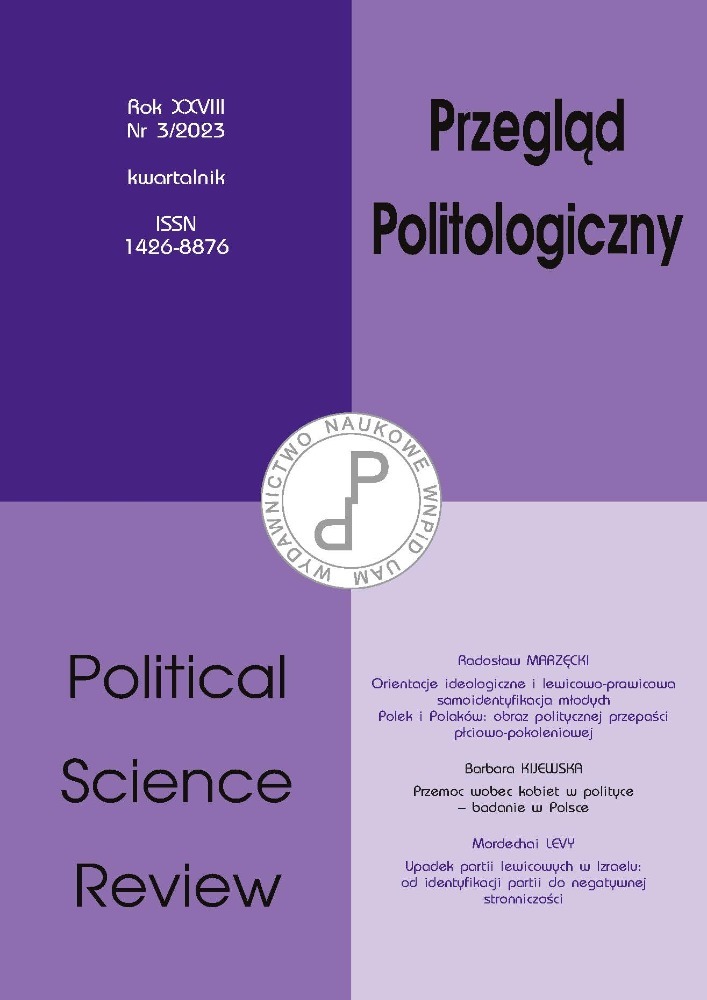Abstract
The increase in women’s participation in political life in recent decades has resulted in research explaining how women’s presence (or absence) changes the form, nature and content of politics. However, a gender perspective is still lacking, especially in the relationship between political participation and violence. Violence against women in politics is increasingly recognised around the world as a significant barrier to women’s participation in political life. The aim of the research is to find out whether politically active women are more exposed to violence (physical, psychological, symbolic, sexual, economic) than politically active men and whether violence against politicians is related to belonging to a political party. The research conducted among Polish politicians (n-88) confirms that both women and men who are politically active experience violence. However, women are more often attacked psychologically, symbolically and sexually. Politicians acting under the banner of a party are much more likely to experience violence than non-partisan politicians. Physical violence is very rare, and the level of experiencing violence in all its forms decreases with age.
References
Bardall G. (2013), Gender-specific election violence: The role of information and communication technologies, “Stability”, vol. 2, issue 3. DOI: https://doi.org/10.5334/sta.cs
Bardall G., Bjarnegård E., Piscopo J. M. (2020), How is Political Violence Gendered? Disentangling Motives, Forms, and Impacts, “Political Studies”, 68(4), pp. 916–935. DOI: https://doi.org/10.1177/0032321719881812
Bielawski K. (2021), W stronę naturalizacji przemocy w polityce, „Teoria Polityki”, 5. DOI: https://doi.org/10.4467/25440845TP.21.006.13786
Druciarek M., Niżyńska A. (2019), Przemoc wobec kobiet na polskiej scenie politycznej, https://www.isp.org.pl.
Franceschet S., Piscopo J. M., Thomas G. (2016), Supermadres, maternal legacies and women’s political participation in contemporary Latin America, “Journal of Latin American Studies”, 48(1), pp. 1–32. DOI: https://doi.org/10.1017/S0022216X15000814
Funk K. D., Hinojosa M., Piscopo J. M. (2019), Women to the rescue: The gendered effects of public discontent on legislative nominations in Latin America, “Party Politics”, May. DOI: https://doi.org/10.1177/1354068819856614
Gender Quota Portal (2023), https://genderquota.org.
Håkansson S. (2021), Do women pay a higher price for power? Gender bias in political violence in Sweden, “Journal of Politics”, 83(2), pp. 515–521. DOI: https://doi.org/10.1086/709838
Holm M. (2020), Violence against women in politics: Emerging perspectives, new challenges, “European Journal of Politics and Gender”, 3(2), pp. 295–297. DOI: https://doi.org/10.1332/251510820X15808264127039
IPU (2020), Women in politics 2020, Retrieved March 11, 2020, from https://www.ipu.org/resources/publications/infographics/2020-03/women-in-politics-2020.
IPU (2016), Sexism, harassment and violence against women parliamentarians, „Issues brief” (Issue November).
IPU (2018), Sexism, harassment and violence against women in parliaments in Europe, Inter-Parliamentary Union, https://www.ipu.org.
Krook M. L. (2020), Violence against Women in Politics, Oxford University Press. DOI: https://doi.org/10.1093/oso/9780190088460.001.0001
Krook M. L., Sanín J. R. (2016), Violence against women in politics: A defense of the concept, “Politica y Gobierno”, 23(2).
Krook M. L., Sanín J. R. (2020), The Cost of Doing Politics? Analyzing Violence and Harassment against Female Politicians, „Perspectives on Politics”, 18(3), pp. 740–755. DOI: https://doi.org/10.1017/S1537592719001397
Kuperberg R. (2021), Incongruous and illegitimate Antisemitic and Islamophobic semiotic violence against women in politics in the United Kingdom, “Journal of Language Aggression and Conflict”, 9(1), pp 100–126. DOI: https://doi.org/10.1075/jlac.00055.kup
Mazurkiewicz P. (2006), Przemoc w polityce, Zakład Narodowy im. Ossolińskich.
National Democratic Institute (2016), Not the Cost: A Call to Action to End Violence Against Women in Politics.
Swedish National Council for Crime Prevention (2019), The Politician’s Safety Survey 2019, https://www.bra.se/publikationer.
License
Copyright (c) 2023 Barbara Kijewska

This work is licensed under a Creative Commons Attribution-ShareAlike 4.0 International License.

